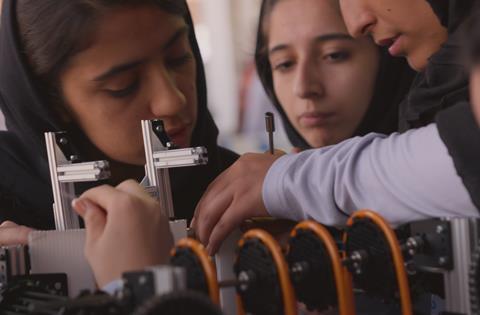Stirring documentary about the mixed fortunes of the Afghan Girls Robotics Team

Dir. David Greenwald. US/Afghanistan. 2022. 72mins.
“I want to help people using science and technology,” says Fatemah, captain of the Afghan Girls Robotics Team. “I also want to go to Mars.” It’s this kind of boundless ambition which earned the team, who took part in competitive robotics events around the world, the nickname the ‘Afghan Dreamers’. But even a dream of leaving the country initially seemed impossible, as this stirring, if somewhat by-numbers, documentary reveals. It took several attempts, and pressure from members of the US Congress, for the teenagers to be given visas to travel to the US for their first competition. Success and a degree of celebrity followed. But as the power shifted in their home country back towards the religious totalitarianism of the Taliban, so did the public perception of the Afghan Dreamers.
A timely cautionary tale – a case study on just how quickly the rights and the opportunities of women can be curtailed, at the behest of the men in power.
This is the second feature length documentary for director David Greenwald, following another film about technology and ambition: The Blech Effect, about troubled biotech entrepreneur David Blech. Previously, Greenwald was best known for his work as an editor, predominantly of music documentaries and videos. This film, with its likeable cast of girl nerds and positive message, should enjoy a warm reception on the festival circuit, and will be of particular interest to events seeking to showcase women’s stories from around the world. It also serves as a timely cautionary tale – a case study on just how quickly the rights and the opportunities of women can be curtailed, at the behest of the men in power.
Fatemah says she was inspired by watching the animated kids’ movie Robots at the age of six – which wouldn’t have been available to her had she grown up under Taliban rule. But when we first meet the girls (and one of their mothers), the grim days of the Taliban were still considered to be a dark chapter of Afghanistan’s past rather than a threat to its future.
The incredible journey of the Afghan Dreamers, as explored by the film through archive news footage and engaging talking head interviews, started in 2017, when 150 schoolgirls took part in a province-wide test in Herat, in the north-west of the country. This group was whittled down to 20, and finally to the group which would make up the team – requirements for participation, explains Fatemah, included a passport, good test scores and their parents’ permission. A natural gift for the nuts and bolts of robot building was also a plus – Lida, who we first see roundly beating her brothers at a shoot ’em up console game, was the kind of kid who spent her early years covered in oil and surrounded in bits of dismantled bicycles.
But parental support is key, in a culture in which it is still considered decidedly odd and a little inappropriate to see a girl holding a wrench. Lida’s mother, a psychologist who was the first woman to learn to drive in her city, offers the girls a safe space to hang out and to talk about the seismic changes in their lives. Following a series of successes at robotics events around the world, the Dreamers become public figures, representatives of a brighter, more progressive future for their country. It’s a mantle that they wear with grace and dignity. This, unfortunately, also makes them targets.
The rumble of unrest in Afghanistan is a perpetual backdrop which suddenly becomes unavoidable when Fatemah’s father, a staunch supporter of his daughter’s aspirations, is killed in a suicide attack on his mosque. It is suggested by some of their neighbours that Fatemah is in some way culpable. Then comes the sudden rise to power of the Taliban, and with it a decree that the Dreamers are infidels and should be put to death.
The robotics team were able to flee the country and are now living in undisclosed locations. The dream continues for the girls, albeit not perhaps in the way they had envisaged and not in the country of their birth. For the next generation of Afghan girls however, the nightmare has started all over again.
Production company: Pale Blue Dot Films
Contact: David Cowan dc@bvp.com
Producers: David Cowan, Beth Murphy
Cinematography: Elizabeth Mirzaei, Beth Murphy
Editing: Edmund Carson
Music: Anton Sanko















![[L-R]: Amanda Villavieja, Laia Casanovas, Yasmina Praderas](https://d1nslcd7m2225b.cloudfront.net/Pictures/274x183/6/4/1/1471641_pxl_20251224_103354743_618426_crop.jpg)








